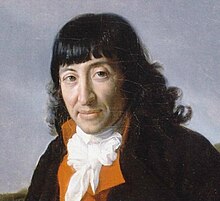Louis-Marie de La Révellière-Lépeaux
Louis-Marie de La Révellière-Lépeaux (born August 24, 1753 in Montaigu (Vendée) , † March 27, 1824 in Paris ) was a politician during the French Revolution and a member of the board of directors from 1795 to 1799 .
Life
Louis-Marie de La Révellière-Lépeaux was born the son of a wealthy notary . He was raised in childhood by a priest who brutally chastised him. Because of this abuse, La Révellière-Lépeaux was marked with a hump and remained a bitter enemy of the Catholic Church throughout his life . He later studied law , but never practiced the profession of lawyer .
The third estate of the province of Anjou elected La Révellière-Lépeaux in the spring of 1789 as a member of the Estates General (États généraux). In 1791 he was appointed a jury member at the Supreme Court and accepted into the administration of the Mayenne department , which elected him in September 1792 as a deputy to the National Convention . He became part of the Girondins and supported the expansion of France through annexation . In January 1793, La Révellière-Lépeaux voted for the death of Louis XVI. La Révellière-Lépeaux was a moderate republican , but he fought vigorously against the Catholic Church and the mountain party , the terror of which he rejected. After the fall of the Girondins on June 2, 1793, La Révellière-Lépeaux was outlawed and had to hide until the overthrow of the 9th Thermidor (July 27, 1794).
In December 1794, La Révellière-Lépeaux resumed his seat in the National Convention, and since April 1795 he has been a member of the Eleven Commission, which drafted the 1795 directorate constitution. In October 1795, La Révellière-Lépeaux was accepted into the "Institut national des sciences et des arts" .
On November 1, 1795, La Révellière-Lépeaux was elected to the Directory , having previously been elected to the Council of Five Hundred and the Council of the Elders . In the board of directors he was charged with the tasks of education, arts and trade. He advocated the expansion policy of France and the formation of sister republics . Furthermore, in May 1796, Carnot and La Révellière-Lépeaux crushed Babeuf's conspiracy of equals .
In order to improve relations with the Pope , in the summer of 1796 the Directory changed its anti-clerical course and applied moderate church policy. La Révellière-Lépeaux rejected this change of course, instead promoting the cult of theophilanthropy . This substitute religion seeks people to return to their “natural” harmony through prayer, reading, speech and music. Essential principles of non-atheistic theophilanthropy are belief in God and in the immortality of the soul . La Révellière-Lépeaux intended to raise this cult to the state religion. He gave theophilanthropic followers the opportunity to celebrate their cult in some Paris churches.
After the three directors Paul de Barras , Jean-François Reubell and La Révellière-Lépeaux, with the help of Generals Lazare Hoche and Napoleon Bonaparte, carried out the successful coup d'état of Fructidor V (September 4, 1797), the Board of Directors returned to anti-Catholic politics. La Révellière-Lépeaux supported the bloodless coup d'état of the 22nd Floréal VI (May 11, 1798), which was directed primarily against the strengthened Neo-Jacobins . However, the directors Barras, Reubell, Merlin de Douai and Nicolas-Louis François de Neufchâteau believed that the theophilanthropists sympathized with the Neo-Jacobins and withdrew their support. Instead, the cult of the decade was promoted by name by Merlin de Douai. La Révellière-Lépeaux failed above all with the cult of theophilanthropy due to the lack of understanding of the people who ridiculed him as the “new pope”. On June 18, 1799, he had to resign from the directorate.
“Oh, you mighty spirit of freedom, you alone could create Bonaparte. Happy France! ”, La Révellière-Lépeaux cheered after the Peace of Campo Formio on October 17, 1797. He rejected the coup d'état of 18 Brumaire VIII (November 9/10, 1799) despite his earlier enthusiasm for General Napoleon Bonaparte . He refused the oath of allegiance to the First Consul of France and resigned from the institute. La Révellière-Lépeaux withdrew disappointed from the public and died on March 27, 1824 in Paris.
literature
- Bernd Jeschonnek: Revolution in France 1789–1799. A lexicon. Akademie-Verlag, Berlin 1989, ISBN 3-05-000801-6 .
- Christina Schröer: heirs of the turning point ; GEO EPOCHE - The Magazine for History, Issue No. 22, Verlag Gruner + Jahr AG & Co. KG, 2006
- Walter Markov , Albert Soboul : 1789. The great French revolution. Urania-Verlag, Leipzig / Jena / Berlin 1989, ISBN 3-332-00261-9 .
- Katharina Middell, Matthias Middell: François Noël Babeuf. Martyrs of equality. New Life, Berlin 1988, ISBN 3-355-00604-1 .
| personal data | |
|---|---|
| SURNAME | La Révellière-Lépeaux, Louis-Marie de |
| BRIEF DESCRIPTION | French politician and member of the board of directors |
| DATE OF BIRTH | August 24, 1753 |
| PLACE OF BIRTH | Montaigu (Vendée) |
| DATE OF DEATH | March 27, 1824 |
| Place of death | Paris |
